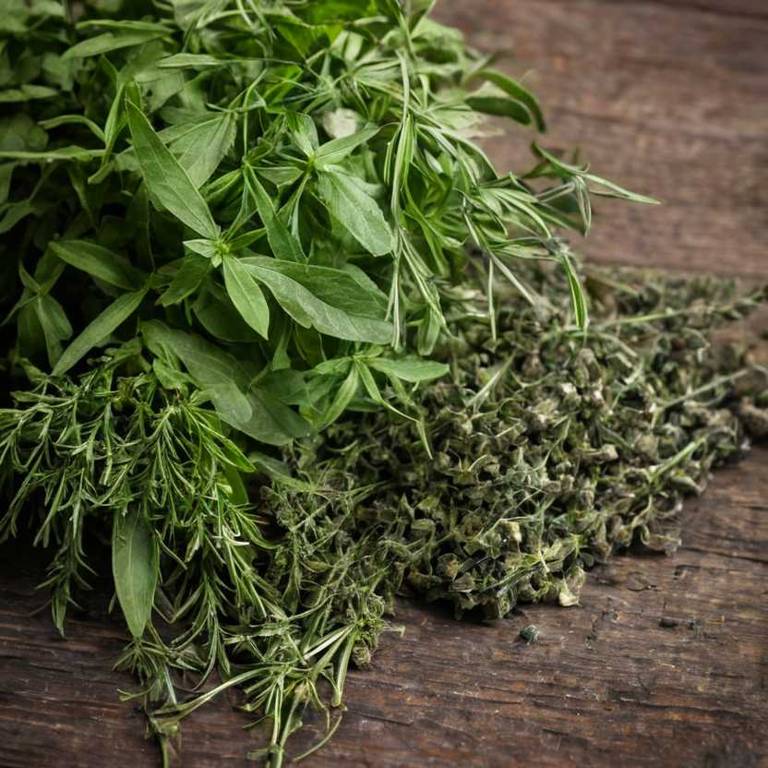By Leen Randell
Updated: Jul 06, 2024
10 Health Benefits Of Marrubium Vulgare (Horehound)

Marrubium vulgare, also known as horehound, has health benefits such as soothing coughs and relieving respiratory issues due to its antimicrobial and anti-inflammatory properties.
The plant's active compounds, like marrubiin, have been shown to calm bronchitis and asthma symptoms. By using horehound in teas or tinctures, individuals can breathe easier and recover faster from respiratory illnesses.
This natural remedy can significantly improve the quality of life for those suffering from chronic coughs and respiratory distress.
This article explains in details the 10 best health benefits of Marrubium vulgare.
1. Relieves respiratory congestion
Marrubium vulgare relieves respiratory congestion because of its unique combination of bioactive compounds.
The plant's leaves and stems contain a volatile oil rich in flavonoids, terpenes, and triterpenes, which exhibit expectorant properties that help loosen and clear mucus from the airways.
Additionally, horehound's anti-inflammatory effects reduce swelling and constriction of airway passages, making it an effective natural remedy for relieving congestion, coughs, and bronchitis.
2. Eases coughing and expectorant
Marrubium vulgare eases coughing and expectorant because of its unique combination of bioactive compounds.
The herb contains mucilages, which soothe the throat and calm irritated tissues, reducing inflammation and discomfort that can exacerbate coughs. Additionally, horehound's saponins and terpenoids have natural expectorant properties, helping to loosen and clear mucus from the lungs, making it easier to expel phlegm and relieve congestion.
This dual action helps alleviate coughing fits and provides quick relief from respiratory issues.
3. Soothes digestive issues
Marrubium vulgare soothes digestive issues because it has a natural anti-inflammatory and antispasmodic effect on the digestive tract.
Its bitter compounds help to stimulate digestion and relieve symptoms of indigestion, bloating, and irritable bowel syndrome (IBS).
Additionally, horehound's expectorant properties can help to reduce inflammation and ease cramps in the stomach and intestines, providing relief from digestive discomfort and promoting overall gut health.
4. Reduces inflammation
Marrubium vulgare reduces inflammation because it contains a unique combination of bioactive compounds, including alkaloids and flavonoids.
These compounds have been shown to inhibit the production of pro-inflammatory chemicals, such as cytokines and prostaglandins, which are involved in the inflammatory response.
Additionally, horehound's anti-inflammatory properties may be attributed to its ability to scavenge free radicals and reduce oxidative stress, a key contributor to chronic inflammation.
5. Acts as a mild laxative
Marrubium vulgare acts as a mild laxative because it contains a unique compound called marrubiin, which stimulates the gut and increases peristalsis.
This natural herb has been traditionally used to treat constipation and other digestive issues, as it helps to soften stool and promote bowel movements without causing discomfort or dependency.
Additionally, horehound's anti-inflammatory properties may help soothe irritated mucous membranes in the digestive tract, further enhancing its laxative effects.
6. Alleviates skin irritations
Marrubium vulgare alleviates skin irritations because of its anti-inflammatory and antimicrobial properties.
The plant's compounds, such as marubiin and flavonoids, have been shown to soothe and calm irritated skin, reducing redness and swelling.
Additionally, horehound's antimicrobial effects help combat bacterial and fungal infections that can exacerbate skin issues, promoting a healthy and balanced skin environment.
7. Combats bacterial infections
Marrubium vulgare combats bacterial infections because of its rich content of bioactive compounds, including alkaloids and glycosides.
These compounds have been shown to exhibit antibacterial properties, inhibiting the growth and multiplication of bacteria such as E. coli and Staphylococcus aureus. Additionally, horehound's antimicrobial activity has been attributed to its ability to disrupt bacterial cell membranes and interfere with their ability to produce enzymes essential for survival.
This natural defense mechanism makes horehound a valuable herb in traditional medicine for treating various bacterial infections.
8. Helps manage diabetes
Marrubium vulgare helps manage diabetes because of its unique combination of bioactive compounds.
Its leaves and stems contain alkaloids, flavonoids, and saponins that have been shown to improve glucose metabolism and insulin sensitivity.
Studies have demonstrated that horehound extracts can decrease blood sugar levels, increase insulin production, and reduce oxidative stress in the body, making it a promising natural remedy for diabetes management.
9. Lowers blood pressure
Marrubium vulgare lowers blood pressure because of its unique combination of bioactive compounds.
The plant contains flavonoids, such as quercetin and kaempferol, which have been shown to possess vasodilatory properties, relaxing blood vessels and reducing blood pressure. Additionally, horehound's saponin content helps to reduce blood vessel resistance, further contributing to its hypotensive effects.
This natural remedy has been used for centuries in traditional medicine to treat various cardiovascular conditions, making it a promising alternative to pharmaceutical interventions.
10. Relieves menstrual cramps
Marrubium vulgare relieves menstrual cramps because of its ability to reduce inflammation and relax muscle contractions.
The herb's bioactive compounds, including flavonoids and terpenes, have been shown to inhibit the production of prostaglandins, which are hormone-like substances that cause uterine muscles to contract and lead to cramping.
By reducing prostaglandin levels, horehound helps alleviate menstrual pain and discomfort, providing relief for women suffering from dysmenorrhea and other menstrual disorders.